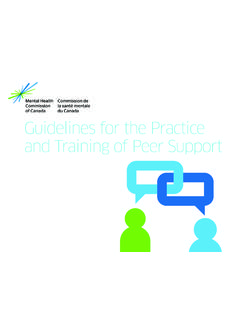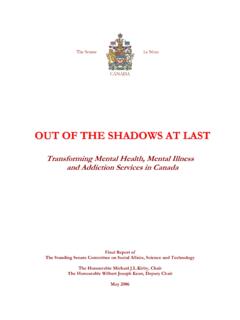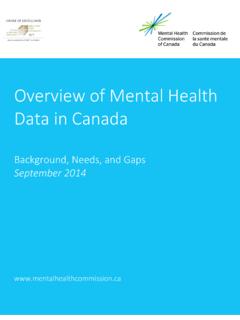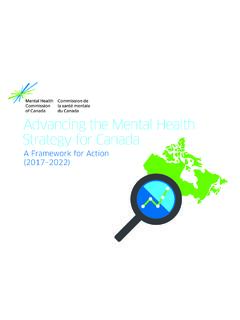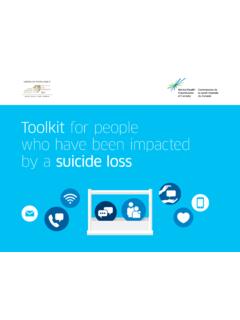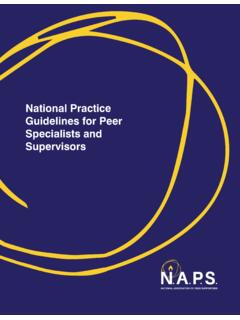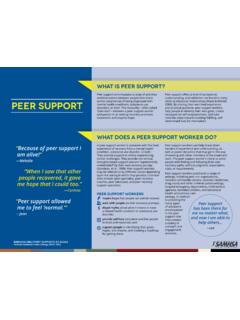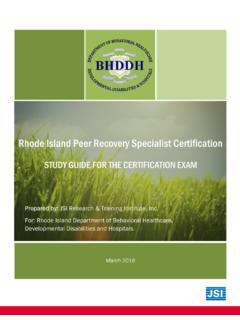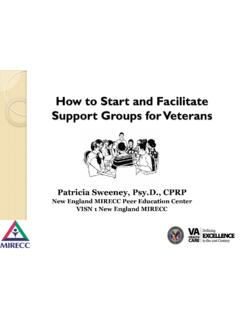Transcription of Guidelines for the Practice and Training of Peer Support
1 Guidelines for the Practiceand Training of peer SupportAcknowledgementsProject TeamSapna Mahajan, Director Prevention and Promotion Initiatives, Mental Health Commission of Canada Kim Sunderland, Executive Director, peer Support Accreditation Certification (Canada)St phane Grenier, peer Support Accreditation Certification Canada and Mental Health InnovationWendy Mishkin, British Columbia Schizophrenia Society, Victoria BranchMembers of the peer Leadership GroupPROVINCIAL AND TERRITORIAL REPRESENTATIVESD iana Capponi, OntarioTheresa Claxton, OntarioDarrell Downton, SaskatchewanBrian Eaton, YukonEugene LeBlanc, New BrunswickRoy Muise, Nova ScotiaKaron-Ann Parsons, NewfoundlandPatrick Raymond, British ColumbiaDebbie Sesula, British ColumbiaFrances Skerritt, Qu bec Chris Summerville, ManitobaDebbie Wiebe, AlbertaOTHER ADVISORSElla Amir, Action on Mental Illness, Qu bec Ian Arnold.
2 peer Support Accreditation Certification CanadaLiz Atkins, Canadian Mental Health Association, EdmontonShana Calixte, Northern Initiative for Social Action Andy Cox, The IWK Health Centre Joan Edwards Karmazyn, National Network for Mental HealthLaurie Hall, MHCC Service Systems Advisory Committee Donna Hardaker, Workplace peer Support ConsultantKaren Liberman, Mood Disorders of OntarioSandy Palinski, Ontario Ministry of EducationDeborrah Sherman, Ontario peer Development Initiative Rachel Thibeault, peer Support Accreditation Certification Canada and University of OttawaFiona Wilson, St. Joseph s Healthcare, HamiltonThe insight and expertise found within this document originated from peer Support workers and peer Support organizations across the country.
3 Kim Sunderland was primary author, with Wendy Mishkin as co-author on the Training Guidelines . Input, direction and guidance was provided throughout from the peer Leadership Group. OTHER CONTRIBUTORSS teve Lurie, Canadian Mental Health Association, London Francine Knoops, Senior Policy Advisor, Mental Health Commission of Canada MHCC Service Systems Advisory CommitteeTraining Guidelines Working GroupDiana Capponi, Centre for Addiction and Mental Health, TorontoJuan Cargnello, Psychology Consultant, Operational Stress Injuries National Network, Veterans Affairs CanadaTheresa Claxton, Ontario Association of Patient CouncilsDonna Hardaker, Canadian Mental Health Association York Region, York Region John Massam, Coast Mental Health, VancouverWendy Mishkin, British Columbia Schizophrenia Society, Victoria BranchRoy Muise.
4 Self-Help Connection, Nova ScotiaDon Palmer, British Columbia Schizophrenia Society, Victoria BranchDeb Sherman, Executive Director, Ontario peer Development InitiativeChris Summerville, Manitoba Schizophrenia Society and Schizophrenia Society of Canada This report was prepared by Kim Sunderland with Wendy Mishkin as co-author for the Training Mental Health Commission of Canada provided INFORMATIONS uggested citation: Sunderland, Kim, Mishkin, Wendy, peer Leadership Group, Mental Health Commission of Canada. (2013). Guidelines for the Practice and Training of peer Support . Calgary, AB: Mental Health Commission of Canada.| Retrieved from: 2013-2016 Mental Health Commission of CanadaThe views represented herein solely represent the views of the Mental Health Commission of Canada.
5 Production of this document is made possible through a financial contribution from Health CanadaGuidelines for the Practice and Training of peer SupportContentsOrganization and Overview 4 Purpose 5 Development Of The Guidelines 6 Background 7 peer Support 8 Value Of peer Support 11 Using The recovery Philosophy In peer Support 12 Family Based peer Support 13 Practices Of peer Support 14 Preparing For peer Support Of A Formalized Nature 15 Part 1 Guidelines for the Practice of peer Support 17 Guiding Values And Principles Of Practice For peer Support Workers 18 Principles Of Practice
6 19 The Requirement of Lived Experience and recovery 21 recovery 21 Skills, Abilities, And Personal Attributes Of A peer Support Worker 22A. Skills, Abilities and Personal Attributes that are derived from Lived Experience 22B. Skills, Abilities and Personal Attributes that are related to Interpersonal Communication 22C. Skills, Abilities and Personal Attributes that demonstrate Critical Thinking 22D.
7 Skills, Abilities and Personal Attributes that are related to Teamwork and Collaboration 23E. Skills, Abilities and Personal Attributes that are related to Ethics and Reliability 24 Knowledge And Training Recommendations 25 Knowledge And Skill Development 26 The Value of Connecting With a Community of Practice 26 Overcoming Accessibility Hurdles 26 Part 2 The Guidelines for peer Support Training 27 Training For The Two Types of
8 Lived Experience 29 Lived Experience, Self-Awareness and Innate Ability 29 Training Themes 301. Fundamental Principles of peer Support 312. Social and Historical Context of peer Support 343. Concepts and Methods that Promote Effective peer -To- peer Effectiveness 36 Training Methods 41 Practical Considerations 42 Scheduling 42 Accessibility 42 Summary
9 43 Glossary 45 Notes 47 Guidelines for the Practice and Training of peer Support | 4 Organization and OverviewThe introduction provides an overview of the background on peer Support and outlines the purpose and preparation of the document is comprised of two sets of 1, Guidelines for the Practice of peer Support , provides an overview of the elements for the Practice of peer Support , along with the guiding values, principles of Practice , and skills and acquired abilities to be respected by all involved in peer Support programs that offer a more formal or intentional form of peer 2, Guidelines for the Training of peer Support , focuses on the Training of peer Support workers and outlines the skills and knowledge to be included in Training programs designed to prepare someone to provide peer for the Practice and Training of peer Support | 5 PurposeThe two sets of Guidelines are intended to provide direction to policy makers, decision makers, program leaders and the Canadian public about the Practice of peer Support .
10 The two sets of Guidelines offer elements for the Practice of peer Support and an outline of the underlying values, principles of Practice , skills and abilities of encourage prospective and practicing peer Support workers to consider the set of Guidelines as a roadmap for personal development, and we encourage administrators to consult the set of Guidelines as they develop or enhance peer Support programs within their sets of Guidelines focus on a structured form of peer Support that fosters recovery . The peer Support worker 1 will have lived experience 2 of a mental health challenge or illness, or is a family member or loved one of someone who does, 3 is in a positive state of recovery 4 and has developed an ability to provide peer content of the Training Guidelines parallels the critical elements outlined in the Guidelines for the Practice of peer two sets of Guidelines Support Changing Direction, Changing Lives: The Mental Health Strategy for Canada, developed by the Mental Health Commission of Canada, and are meant to be consistent with its goals for achieving the best possible mental health and wellbeing for everyone.
